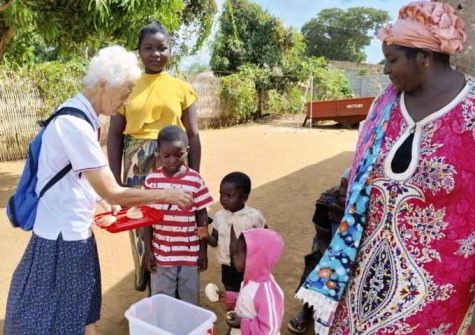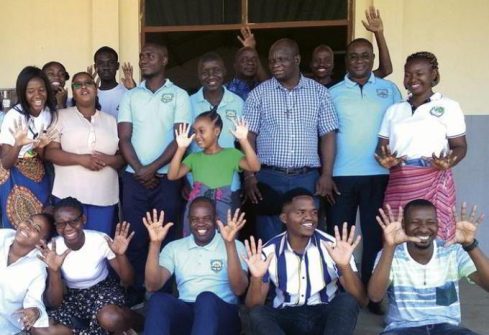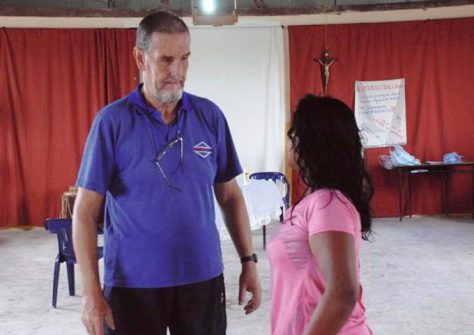Mission. Giving hope despite everything.

Three Comboni Missionaries are sharing their experience with displaced people, young drug addicts and Christian communities.
Mozambique. Sister María del Amor Puche talks about the difficulties faced by people caught between guerrilla groups and refugee camps. Insecurity and fear. Commitment to women. Small microcredit projects.
I live in Balama, in the Diocese of Pemba, in the Province of Cabo Delgado in Mozambique. The parish has about 75 communities that we visit regularly. A few kilometres from the mission, there is an active guerrilla group that has been causing internal displacement and carrying out killings for the past five years. As a result, we all live in fear. In the diocese, they have looted, destroyed, and burned about eight missions, leading to their closure. Two years ago, one of our Comboni Sister was killed, and last year, two other nuns were kidnapped in this area. Although they were later released, the fear was immense. All of this has led to great instability and suffering for the people. It is truly a persecuted Church.In the vicinity of the mission and several nearby villages, there are three refugee camps where many people live in poverty. Each camp can house around 300 families, with an average of 13 to 14 members per family. The living conditions there are dire: there is a severe lack of food and water, and essential services such as schools and hospitals are non-existent.

Sister María del Amor Puche with children women in a refugee camp. File swm
People are living in extremely harsh conditions, relying on makeshift tents supported by just a few sticks. While we did receive some humanitarian aid from organizations that used to operate in the area, they have recently departed. We are doing our best to assist, but our efforts are limited. It feels like a small drop in an ocean of suffering. Amid this pain, as Comboni Missionaries sisters, we work with displaced women. We have sewing, listening and literacy groups… They are a great help to the women because, in addition to what they learn, they can express all the pain they carry inside. There is a lot of suffering in their lives and these small communities allow them to listen calmly and without judgment.
For four or five months, we have been supporting several microcredit initiatives. We give them a small amount of capital to start a resource-generating activity. During the meetings, we offer them basic and simple training in home economics so that they feel supported and understood.
We are actively involved in various pastoral activities, particularly in training young people. It’s disheartening to witness so many individuals experiencing insecurity and lacking access to education. Some young people have left the area, while those who have remained have formed small groups. We strongly believe that education has the power to bring about positive change. By providing training, we can lay the groundwork for a new mindset and a better future for both men and women, enabling them to contribute meaningfully to their communities.
Mozambique. Keep moving
After fifteen years, he returns to his homeland. He shares his feelings and plans for the future after a year as a parish priest.
My name is Father José A. Intuela Sagras, a Comboni Missionary from Mozambique. I was ordained priest in May 2014. My first mission was in Chad, where I lived for nine years. In June 2023 I returned to Mozambique and was assigned to the parish of São Francisco Xavier de Benfica, on the outskirts of the capital, Maputo. Although I had not expected it, I welcomed this new ministry.
A month later, I arrived at Benfica to begin my service and was surprised by the enormous generosity of the parishioners. Not only had they mobilised to renovate my room and buy several sets of sheets, but they had also prepared a welcome cake for me.
I felt the warmth of the welcome that we Africans appreciate so much. The people were very happy because they had not had a regular priest since 2020. I saw the joy on their faces and I said to myself: “Lord, will I be able to live up to the expectations of these people who have put their trust in me?” Countless times during the months I have been here, I have entrusted myself to the Lord to help me be a good pastor.

Father José A. Intuela Sagras with young people from the parish. File swm
During this time I was able to meet all the heads of the different ministries and sectors and understand the reality on the ground. I felt like a moving train and I tried to get used to what was happening. The people and my Comboni brothers helped me a lot during this time. I am indeed Mozambican, but I have been living outside my country for more than 15 years and I come from Quelimane, a city in the centre of the country, so I knew little of the reality of Maputo. I still have great difficulties with languages.
Here they speak mostly Changana and Ronga, two languages that are very similar but very different from the ones I use, so I am working hard to learn them because I am convinced that the Gospel must be proclaimed in the language of the people. In any case, we use Portuguese in the formation meetings and in the liturgy, although we do some readings in Changana and Ronga.
Little by little I took note and identified the main challenges in catechesis, liturgy and the formation of pastoral workers, children, adolescents, young people and couples. We have monthly parish councils and we focus on the areas where we propose improvements. At the end of last year, we had a general parish meeting where we were all able to take stock of the activities that had been carried out and those that had not been completed, as well as identifying the difficulties that have now become pastoral priorities.
I cannot forget that we live in a very young country, where there are many children, adolescents and young people who face many difficulties, both spiritual and social, and it is necessary to accompany them. In this sense, we realised that it could be very helpful to have a structure where they could meet and interact with each other. We saw that sport has an enormous power to unite and we created a simple multi-sports field. The aim is not only to practise sport but also to attract young people and then propose activities for their human, social and spiritual growth.
Colombia. With the poor and drug addicts.
“In my community, we decided that this year I would dedicate part of my time to reaching out to dozens, perhaps hundreds, of men, women and young drug addicts who roam the Charco Azul neighbourhood in Cali. I started by approaching a bench they had built under a tree”. Father Franco Nascimbene, an Italian Comboni missionary, tells us.
In that place, at any time of day or night, there is always a small group of people sitting and taking drugs. For a month I sat with them two or three times a week to listen to them and chat. Sometimes it is not so easy. One young man talked all the time and never said a sentence that had anything to do with the previous one: with him, the dialogue failed.
Another man spent more than half an hour insulting me because ‘I was full of money that the Vatican sends me and I do not want to give it to him’. Then there was the fellow who kept asking me to invite him to lunch. Other encounters are more pleasant: like the one I had with three teenagers whom I asked where they got the money to buy drugs, they admitted to stealing but explained to me that they were “good thieves” because they don’t steal in the neighbourhood, but in other areas… I also spoke with a young mother who explained to me that she had been taking drugs for 15 years, but that since she had children she had given up “hard” drugs and smoked only “marijuana”. When I asked her why he hadn’t stopped, she told me that she couldn’t.

Father Franco Nascimbene talks to a woman in the community centre. File swm
We also spoke with a “theologian” addict who went on about the rosary and devotion to Our Lady of Mount Carmel and the difference between praying and asking. What is the meaning of these encounters? I don’t know exactly. For the moment, I think that in an environment where everyone feels despised, it can be “Good News” for them to meet a priest who is not ashamed to sit among them and listen to them. What will come of it? I don’t know… time will tell and the Spirit will inspire…
The generosity of the poor never ceases to amaze me: a few weeks ago, I visited a house where three elderly people between 75 and 90 years old live. They are brothers, they are very thin and have never had children or a partner. They no longer have the strength to work. When I asked them how they managed to eat, they replied that there is always a neighbour who brings them something.
So, I joined the neighbours who bring them food from time to time. Recently, I was reading a biblical text that said that anyone who contemplates Jesus crucified is saved. At Mass, after reading the Gospel, at the time of the homily, I went to sit in the middle of the church with the microphone in my hand… and I invited everyone to look at
Jesus on the Cross. SWM



